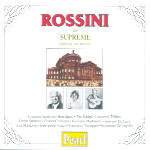This is an hour and 17 minutes of music culled from Pearl’s huge catalog of dead great singers. The sound is typically mediocre, but the performances are all stellar. The biggest star actually is the mezzo Conchita Supervia, whose odd timbre and quick vibrato are a taste worth acquiring and who brings élan and great individuality to everything she sings. Much the same can be said about Nazzareno De Angelis’ Mosé excerpts, complete with ravishing trill; Tito Schipa, with sheer loveliness exuding from every note; the all-too-little-known Hina Spani; and Feodor Chaliapin who sings so vividly that he is practically visible. Less appealing but still fine are Giovanni Martinelli and Francesco Tamagno, who offer steel in Guillaume Tell where a bit of class might have been welcome. If you don’t own these selections elsewhere, this is for you. [7/13/2000]
































